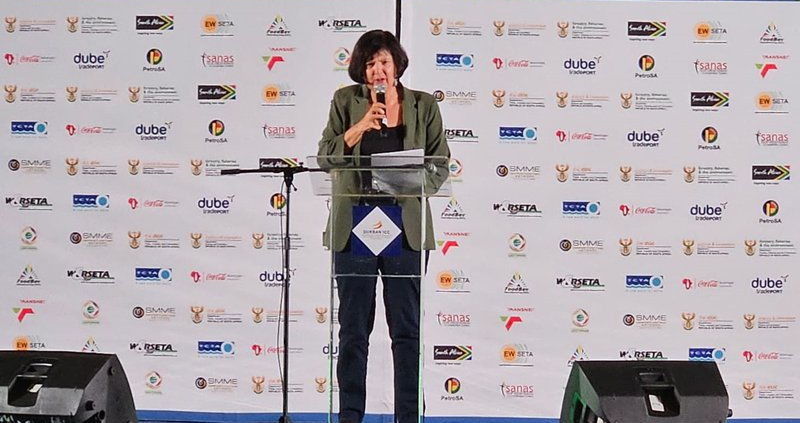Minister Barbara Creecy: 8th annual Green Youth Indaba
Programme Director
Advocate Linda Zama – KZN Premier’s Office;
Cllr Ntando Khuzwayo – City of eThekwini;
Mr Sanele Zulu – Green Youth Network Chairperson;
Esteemed guests,
Sanibonani eThekwini
Good morning and thank you for inviting me to join you at this important eighth annual Green Youth Indaba.
As we near the end of Youth Month tomorrow, allow me to extend warm greetings to this wonderful gathering of youth delegates who come from all over South Africa.
Our country honours Youth Month in June each year as a way of paying tribute not only to the generation of 1976, but also as a way of acknowledging the enormous energy, enthusiasm and ingenuity young citizens people bring to our society.
I am aware that many of you feel that you are faced with difficult and challenging times. Many of you may believe these are more difficult and more challenging than many of the generations that have gone before you.
As a Minister I receive heart breaking emails and calls from your peers who tell me they have university qualifications or years of volunteering experience but are unable to find meaningful employment.
That is why a gathering such as this is so important and I want to congratulate those of you who have joined the Green Youth Indaba today, because I believe this important initiative can make a meaningful contribution in your own lives and to youth development in general in this complex and difficult world.
Let me begin today by introducing the concept of sustainable development as the only correct approach we can take to solving the economic problems of our time.
Sustainability is an important concept for all of us here because it teaches us that the way in which we meet our current needs as humanity should not impact on the ability of future generations to meet their own needs.
Unfortunately, your generation must confront the fact that previous generations have not used nature’s resources in a sustainable manner and so today’s youth face the triple crises of climate change, biodiversity loss and environmental pollution, all which not only threaten the future of the natural world as we know it, but also our survival as humanity.
The world in which we live evolved over thousands of years to provide life on Earth with what we call ecosystem services: the air we breathe, the water we drink and use to water our crops and clean our clothes; the soil in which we grow our food; and the ocean that provides the fish we eat.
Human activity and the careless and greedy way in which we use our natural resources is fundamentally damaging these precious and life- giving ecosystems. In many parts of our country the air is so polluted it results in respiratory illnesses.
Untreated sewerage is threatening our water systems; carbon emissions are causing global warming and extreme weather events and our disregard for nature will likely result in the mass extinction of species before the end of the current century.
I mention these existential issues today because they will increasingly shape the world in which you will live and will increasingly impact on the economy, built environment, and food and water security.
By way of example, climate change causes extreme weather events. The tornado hit eThekwini on Tuesday. The devastating floods here in KwaZulu-Natal in April last year destroyed over four hundred lives and thousands of homes. The floods also had a lasting impact on water and sanitation systems; tourism and beach access; and the export capacity of the Port of Durban, and consequently on the wider economic ecosystem of the province of KwaZulu-Natal.
The question we must ask today is whether, in the face of these human induced environmental challenges, we are powerless? The answer is definitely not. While time is running out to mitigate the effects of climate change, biodiversity loss and environmental pollution, science tells us it is not too late, and we must act with urgency in this decade.
Ladies and gentlemen,
Our country is a signatory to the three Rio Conventions relating to Climate Change, Desertification and Biodiversity. In signing the Paris Agreement on climate change in 2015, our government committed to giving its best effort to prevent average global temperature increases to well below two degrees and to ensuring that we progressively meet the target of placing thirty percent of the land and the sea under protection.
These targets are not easy for any developing country to meet and ours is no exception. We have already spoken about the scourge of unemployment facing young people. Ensuring the provision of basic services including education, health care, human settlements and social services places big demands on government resources.
And so, the question that arises is how will a developing country such as ours, which has so many demands on government and public resources, finance the transition from our current high carbon economy to a low carbon climate resilient economy and society? How will we help vulnerable communities to become more climate resilient? Who will pay for the loss and damage that will arise as a result of extreme weather events and global warming?
This raises the issue of Justice. The current climate emergency is the direct result of over 200 years of industrialisation which has taken place in the developed north.
The African continent has contributed less than four percent to global emissions which cause global warming. And yet African countries are warming at twice the average global rate and young people, women and communities living in conditions of poverty who have contributed the least to the climate crisis, will be worst affected.
For this reason, South Africa has joined other developing countries in arguing that developed countries have to support developing countries in building new forms of energy generation, transportation and industrialisation that reduces green-house gas emissions.
We know that conserving ecosystems such as forests, coral reefs and other carbon sinks helps mitigate the impact of climate change. Many of these carbon sinks are found in the mega biodiverse countries in the developing world.
Yet biodiversity provides the ecosystem services we all need. For example, the rainforests of the Congo and Amazon basins are what we call the lungs of the world. So, when SA joined other countries in signing the Kunming-Montreal Protocol in December last year we called on developed countries to assist in financing the rehabilitation and conservation of biodiversity.
When we talk about Justice in the climate and biodiversity space we are talking about justice between the developed global north and the developing south; we are talking about justice between current and future generations; we are talking about justice between workers and business so that workers and vulnerable communities do not carry the cost and the risk of the transition while others enjoy the benefits.
And we are of the opinion that there can only be justice if those who have created the global problems of climate change, biodiversity loss and environmental degradation help developing countries benefit from the new green industrial revolution that is sweeping the globe.
In fact, I would go so far as arguing that in the modern world there are two main areas of economic development: the one is of course the IT space. The other is a wide category of activities that we can loosely call the Green Economy.
Ladies and gentlemen,
The key driver of the green economy is the transition to low carbon forms of energy generation, storage, mobility and industrial production. In the mining sector this is driving new demand for what are considered the minerals of the future – platinum, lithium, copper and vanadium, amongst others. These are used in the production of fuel cells and battery storage technology.
This also supports new forms of industrialisation to produce components for renewable energy installations, batteries, fuel cells, electric vehicles and for green hydrogen.
New forms of food production that use less water, energy, fertilisers and pesticides are driving new research and development. Declining fish stocks are already leading to a surge in aquaculture production in both coastal and inland communities.
Public demand for eco-tourism is fuelling renewed interest in South Africa’s tourist offerings and our conservation management authorities are already promoting public-private partnerships to improve tourism offerings in a number of national parks.
Recently, South Africa joined 175 countries in supporting an international pact to end plastic pollution. This pact requires that we promote strategies to reduce, reuse and re-cycle plastic, as well as improve our waste management strategies in the country.
The pact is already promoting better co-operation between business, government and waste reclaimers and it promotes a recycling industry that has in recent years created close to 71 000 jobs.
By way of conclusion let me go back to where we started: the conundrum of youth unemployment in our country. I have tried today to show you that the environmental crises of climate change, biodiversity loss and environmental degradation pose an existential threat to all of us.
The new green production revolution they are driving offers new possibilities for employment, ownership and shared prosperity. This indaba is all about how you can get involved and what opportunities there are to gain skills and become part of the new forces in the world.
Let me close with a quote from award winning author Ben Okri who wrote in his poem “A new dream of Politics”:
“There’s always a new way,
A better way that’s not been tried before”.
I thank you.



Leave a Reply
Want to join the discussion?Feel free to contribute!